
Transitioning from solo projects to working as part of a large team can be tricky to navigate. Creating collaboratively requires excellent communication, tact, empathy, ego management, and a host of other skills that can make the difference between being someone that pushes the team forwards and someone who holds it back. If you get it right, there’s a huge amount to be gained both personally and professionally from working as part of a pipeline.
A senior concept artist in video game development, Thomas Mahon sees working on a pipeline as an opportunity to grow in ways that might be left if you only ever work undeveloped alone. A shift in perspective is needed, though. "On a team, the artwork doesn't belong to just one person, it belongs to the project as a whole, so a level of conformity is expected," he says. "It's likely you'll have to hand off work to another artist, and being flexible with your style is valuable."
When you first arrive, it's important to grasp the workings of the whole pipeline you're part of, especially the technical limitations. "Not knowing the constraints can lead to bolder designs, but it's good to be aware of the rules before you bend them," he says.
OVERCOMING LIMITATIONS
It may feel as though technical constraints are holding you back, but Thomas points out their presence often results in greater creativity. If the game you're working on targets lower-spec hardware, it's a chance to do something else. "You have an opportunity to make something timeless with strong art direction that embraces its limited scope," he says.
Diese Geschichte stammt aus der July 2023-Ausgabe von ImagineFX.
Starten Sie Ihre 7-tägige kostenlose Testversion von Magzter GOLD, um auf Tausende kuratierte Premium-Storys sowie über 8.000 Zeitschriften und Zeitungen zuzugreifen.
Bereits Abonnent ? Anmelden
Diese Geschichte stammt aus der July 2023-Ausgabe von ImagineFX.
Starten Sie Ihre 7-tägige kostenlose Testversion von Magzter GOLD, um auf Tausende kuratierte Premium-Storys sowie über 8.000 Zeitschriften und Zeitungen zuzugreifen.
Bereits Abonnent? Anmelden
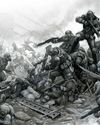
PAINT EPIC BATTLES IN TRADITIONAL INK
Warhammer illustrator THOMAS ELLIOTT shows you how to create an epic science fiction fight scene with this step-by-step guide
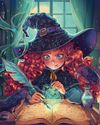
CONJURE MAGIC ILLUSTRATIONS
Daria Anako demonstrates her process for creating a whimsical piece of art with some spellbinding touches
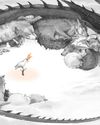
First Impressions
We discover the early influences that inspired the artist
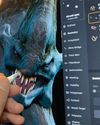
ZBrush for iPad
GAME CHANGER The desktop version of popular 3D sculpting software ZBrush has been redesigned for iPad - and it's brilliant

BenQ GW2786TC
GET AN EYEFUL Don't scrimp out on your health with a monitor that's kind on the eyes and good for creative tasks
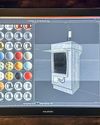
Huion Kamvas Pro 19
TABLET WARS An attractive pen display does an excellent job of balancing price and performance as it sets out to challenge its rivals in the mobile marketplace
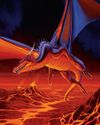
DRAGON OFORCEC
Legendary D&D artist Larry Elmore explains the keys to crafting timeless fantasy art.
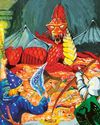
DUNGEON MASTERS
ImagineFX marks the milestone 50th anniversary of the launch of Dungeons & Dragons with a look at its rich tradition of illustration
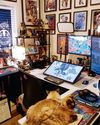
Erik Ly
Gamer's haven Why the artist enjoys a maximalist aesthetic more than the minimalist approach.
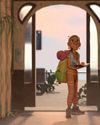
2D meets 3D: How the workflows are merging
Interdimensional As VFX and animation evolve and tools become more accessible, Tanya Combrinck asks whether the separation between the mediums is reducing